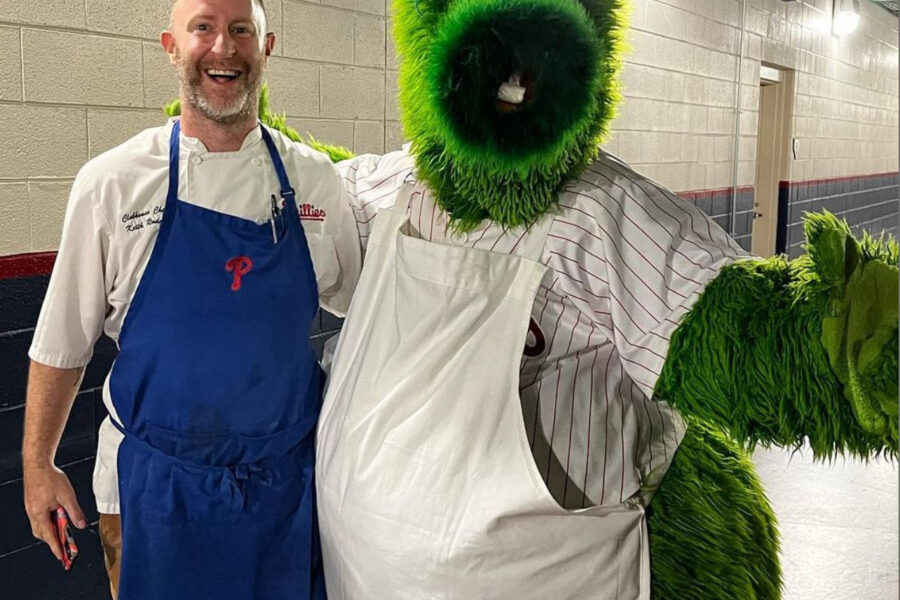
Chef Keith Rudolf and the Phillie Phanatic
Eat.
Sleep.
Baseball.
Repeat.
When post-season baseball starts, the pressure grows, and players become even more focused on winning. Because of that, teams must be more capable of performing at peak levels. A mini-slump or a couple of bad innings could lead to a disastrous end to the year.
Keith Rudolf knows all about how important it is to be ready at the season’s most important time. And his role on the Phillies is vital, even if there are times when he never sees the game – except on television.
Since 2017, Rudolf has been the Team Chef for the Phils. He and his staff of four are responsible for providing three meals a day for players, coaches and staff. Often that means a menu with eight or nine entrees. But when October comes, Rudolf and his team are even more productive.
“During the playoffs, we may do 12-to-14 entrees,” Rudolf says. “We want everybody to get whatever they want. We’re trying to win the World Series, and if they want something, I’ll have it. I don’t want somebody upset because we didn’t have lamb chops.”
During his seven seasons with the Phillies, Rudolf has helped transform the game-day food offerings from cheesesteaks, burgers and grilled cheese sandwiches to more nutritious fare designed to help improve performance and keep players healthy. Sure, there are still players who want the occasional candy bar or sugary cereal, but Rudolf and his staff work to make sure the vast majority of the food offered in the clubhouse on game day is healthy and comes from sources working to raise it in ways that are more nutritious.
“We are able to key into the cleanliness of the actual products we use,” Rudolf says. “We use the cleanest cows, pigs and produce. We find the best farms. We’re making sure the animals are grass-fed and grass-finished. They’re not just giving the animals grains at the end to fatten them up before sale.”
That wasn’t always the case for the team. Rudolf was hired after the players and management collectively bargained to require teams to hire a chef (and staff) or contract the clubhouse food preparation to an outside company. Before the deal, the players had to pay for the food they ate, a big reason why there were fewer healthy options and no real plan.
In 2017, the Phillies also hired Steph MacNeill, MHSc, RD, CSSD [which stands for Master of Health Science, Registered Dietician and Certified Specialist in Sports Dietetics], as Nutrition Coordinator, and she has helped players improve their performance. At first, she worked with all of the organization’s teams. Last year, the Phillies hired three more full-time nutrition experts to handle minor-league needs. MacNeill helps players take the proper supplements, monitors their hydration needs and manages their allergies to various medications and foods. She also consults with Rudolf on menus and travels with the Phillies to make sure the caterers who handle clubhouse meals are high quality. Her work is alien to some players, but she has made progress.
“Baseball has changed a lot in the last 10 years,” she says. “A lot of players were not used to working with dieticians. I don’t want to turn the tables so people are thrown off. I’m looking for small wins.”
When Rudolf started, after working in the restaurant business for more than two decades, he was the only person in the Phillies kitchen. Since then, his ranks have swelled to the current four-person staff. When people think about how the Phillies have spent money to improve the organization, they don’t realize that putting resources into feeding the players makes a difference in terms of performance.
“The demand for healthier options skyrocketed once the team began to change the roster,” Rudolf says. “Bryce [Harper] and J.T. [Realmuto] and bigger name guys want to be healthy and do things the right way.”
In 2014, when Rudolf’s second child was born, he was running the kitchen at Terrain in Glen Mills, working 100-hour work weeks. “I couldn’t do it anymore,” he says.
Rudolf had begun working in restaurants while at Council Rock HS, where he graduated in 1995. While in high school, he stopped playing soccer but missed the team atmosphere. He took a job at a local restaurant and “felt part of a team again.” One day, the fry cook didn’t show up, and Rudolf received a battlefield promotion.
Rudolf was convinced he had found the perfect career path. Over the next several years, he worked at a variety of restaurants, learning and developing skills. He connected with renowned Philadelphia chef Tony Clark, who died in July 2022. Rudolf convinced Clark to give him a chance and was told to arrive the next day at the old Sheraton Hotel on Rittenhouse Square (now Parq) for work at 6 a.m. Rudolf stayed with Clark for a year before heading to Los Angeles.
“Tony was my mentor,” Rudolf says. “I owe him my career. I still think about him. It’s like the ‘What Would Jesus Do?” concept. Instead, I ask myself, ‘What would Tony think of the dish I am making.’”
Rudolf spent “four or five years” in California before returning to the area. He worked at Le Mas Perrier in Wayne before heading to Terrain. When Rudolf stopped working in 2013, he had some “odd jobs.” Things were not good. “Things were not going well,” he says. “It was a dark time.”
At the time, Rudolf was friends with Katie Cavuto, then the dietician for the Phillies and the Flyers. One day, she called him and told him the Phillies were looking for a chef. Was he interested?
Of course he was.
At first, it was just Rudolf, and he had work to do. He would produce a daily menu with six to eight items, but nobody would eat it. “I spent my days prepping the buffet and then making cheesesteaks,” he says.
Former Phillies first baseman Rhys Hoskins was the first player to see what Rudolf was trying to accomplish. “I thought, ‘There’s a possibility here,’” Rudolf says. He started to change things slowly, using grass-fed beef and cheeses with higher nutritional values when making cheesesteaks. He gradually made other changes, until the players were accepting the differences.
The Phillies stepped forward, too, building a kitchen in the clubhouse and allowing Rudolf to pick out the grills and ovens he preferred. There is also a full dining room in the clubhouse. “They let me know they were interested in doing this right,” he says. The team’s strength and conditioning and training staff partnered with him to encourage the players to eat better so that they could improve their performance.
And MacNeill plays a sizeable role by finding the right catering companies for road trips and working with Rudolf to maximize the marriage between food and performance.
“During the off-season, we’ll speak about having different theme days when games start,” MacNeill says. “We’ll have twice-a-week recovery days where we’ll focus on Omega 3 fats that can be found in fishes.”
A typical home game day FOR Rudolf begins at about 8-9 a.m. when he arrives in the clubhouse and cleans up anything from the night before that wasn’t addressed. He sits down with a cup of tea and reviews the menu for the day. Since he has to provide three meals, much of the planning is done in advance, with input from MacNeill. He’ll have lunch ready by noon, usually for the coaches and staff. Players show up starting at 1 p.m., and they’ll have some lunch, too.
From there, it’s on to the pre-game meal, which he and his staff will make sure is ready by 4 p.m., which is plenty of time for a 6:40 game time.
“Before the game, the players won’t eat too much,” he says. “It’s more finger foods and sandwiches. Grab and go – and a lot of fruit.”
During the game, Rudolf and his staff see very little – if any – of the action in person. They’re too busy getting ready for dinner, which they serve as soon as the game ends.
“We have the game on TV,” he says. “There are times when we are doing braised meats in the oven that we’ll take a walk out into the stadium to watch. During the playoffs, the games take longer, so we get some time to watch. It’s tough spending a 15-hour day under the stadium.”
The players eat fruit and energy bars while playing, but their biggest meal comes afterward. Rudolf’s day usually ends about an hour to an hour-and-a-half after the game ends. As Rudolf said, post-season games require more effort, but the off-season brings time to recharge and research. Once Spring Training starts, Rudolf spends several weeks in Clearwater, making sure players have the proper fuel. It’s part of a year-long cycle designed to make sure the team has what it needs to win.
“I’m the first team chef for the Phillies,” he says. “That’s an honor.”

